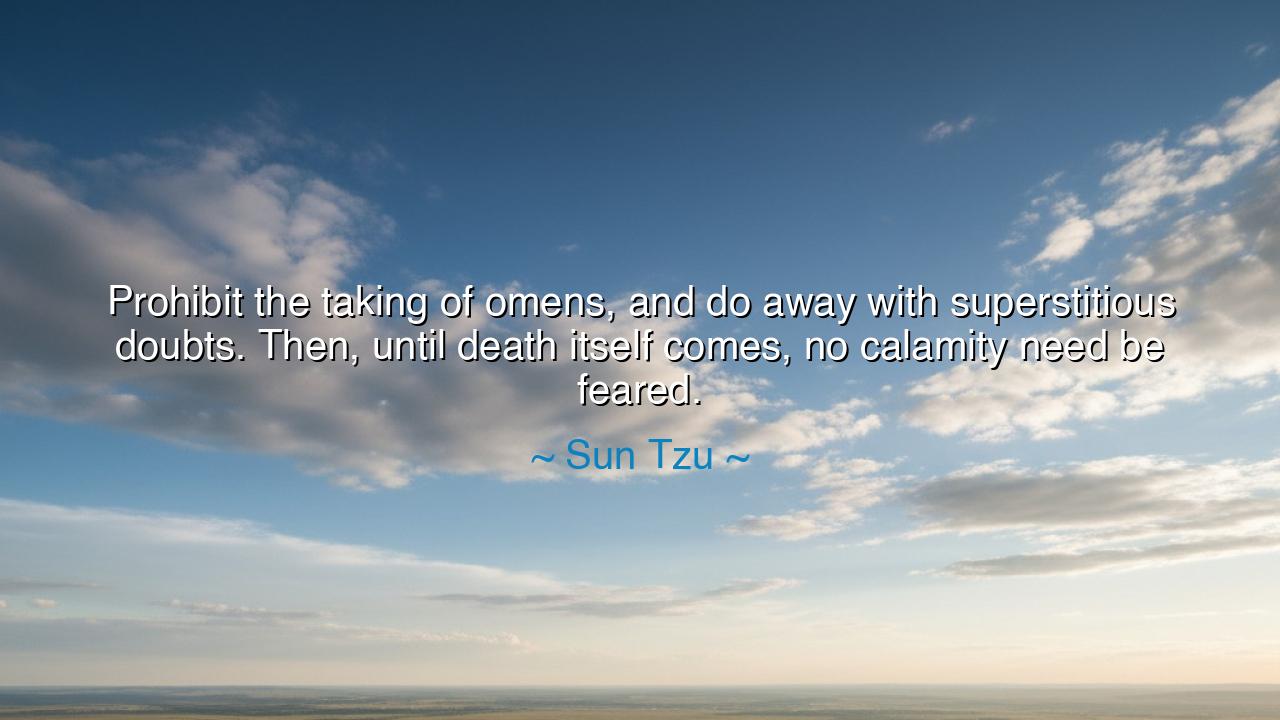
Prohibit the taking of omens, and do away with superstitious
Prohibit the taking of omens, and do away with superstitious doubts. Then, until death itself comes, no calamity need be feared.






In the calm and commanding wisdom of Sun Tzu, the ancient master of strategy, we hear a lesson not merely for war, but for the human spirit itself: “Prohibit the taking of omens, and do away with superstitious doubts. Then, until death itself comes, no calamity need be feared.” These words, drawn from The Art of War, shine like a blade in the fog of uncertainty. They speak to the strength of a mind freed from illusion — a mind unchained by fear of the unseen and untormented by the shifting shadows of fate. For Sun Tzu, mastery in battle begins with mastery of the heart, and mastery of the heart begins with clarity — a rejection of superstition and a devotion to truth.
The origin of this teaching lies in the world of war, yet it transcends the battlefield. In the age of Sun Tzu, generals often sought victory not through preparation and reason, but through omens, divinations, and the counsel of oracles. They gazed into the stars, burned incense to spirits, and cast bones upon the earth, believing that destiny, not discipline, would determine their fate. Sun Tzu, ever the realist, saw in this a fatal weakness. “He who depends on omens,” he warned, “fights blindfolded.” His wisdom was clear: the true leader does not surrender his mind to chance, nor his courage to superstition. For when a man seeks signs in the heavens instead of strength in his heart, he has already lost the war within.
The deeper meaning of Sun Tzu’s words is not a rejection of the spiritual, but a call to inner sovereignty. The man who is ruled by superstition is like a ship tossed by unseen winds — he drifts without purpose, always searching for a sign instead of setting his own course. But the one who casts aside fear of omens becomes as the steady mountain, unmoved by rumor or fate. By rejecting the false security of superstition, he learns the true art of composure: to act based on reason, observation, and discipline, not on trembling faith in invisible powers. Thus, freedom from fear is born not from invincibility, but from clarity of mind.
Consider the story of Hannibal Barca, the Carthaginian general who crossed the Alps to strike Rome itself. When his soldiers, exhausted and terrified by the snow and the omens of eagles circling above, began to waver, Hannibal did not consult the priests or offer sacrifice. He broke an enormous rock with fire and vinegar, showing his men that the mountain could be conquered not by prayer, but by will and ingenuity. He taught them that fear is the greatest barrier to victory, not fate. And so his army, though small and far from home, marched onward — driven not by divine signs, but by faith in their own power. This was the spirit of Sun Tzu’s teaching made flesh: to cast away omens and replace them with action.
The command to “do away with superstitious doubts” is not only for warriors, but for all who struggle with the unseen fears of life. Every generation faces its omens — the whispers of doom, the signs of bad fortune, the dread that unseen forces control one’s destiny. Yet Sun Tzu teaches that the wise man sees through the illusion. The universe does not conspire against us; it simply unfolds according to cause and effect. The man who acts with courage and intelligence will fare better than the one who kneels before the ghost of chance. Superstition, in all its forms, is surrender — the quiet acceptance of helplessness before the unknown. But knowledge and discipline transform uncertainty into strength.
The true power of this teaching lies in the final line: “Then, until death itself comes, no calamity need be feared.” Sun Tzu does not promise that death can be avoided — only that it need not be feared. For once we abandon the illusions that cloud our judgment, we find peace even amid peril. When the mind is free of superstition, it no longer trembles at omens or clings to false hope; it meets the end with the same calm it meets the beginning. The man who walks in such clarity cannot be defeated, for his enemy — fear — has already been conquered. Death becomes not a calamity, but a natural conclusion to a life well lived.
So, my child of tomorrow, learn this wisdom: do not seek omens, and do not bow to superstition. Trust instead in the steady flame of understanding that burns within you. Study, prepare, act with reason — and leave chance to the winds. When the world tells you to wait for signs, forge your own. When doubt whispers of failure, let knowledge and courage silence it. Build your destiny not on rituals or stars, but on the foundation of your own strength and discernment.
For as Sun Tzu teaches, the greatest victory is not won on the battlefield, but within the self. The moment you cease fearing what cannot be controlled, you become unassailable. Until death itself comes, no force can shake you — for you will have achieved the one triumph greater than all others: the triumph of the mind over fear.






AAdministratorAdministrator
Welcome, honored guests. Please leave a comment, we will respond soon